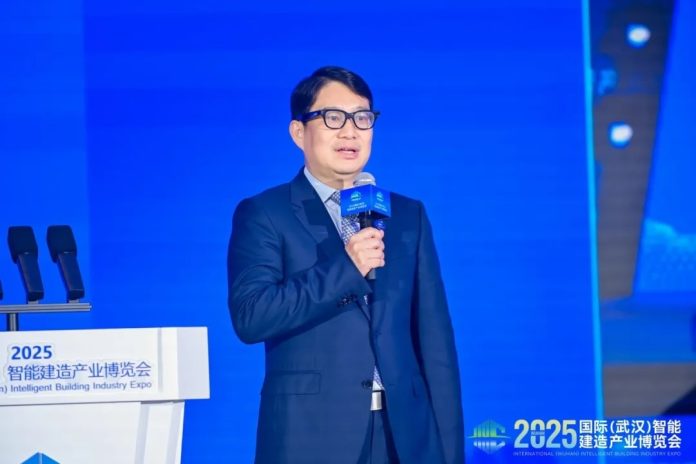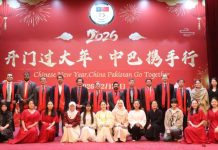By: AB Khan
An International Cooperation Conference on Intelligent Construction was successfully held in Wuhan, organized by the China International Contractors Association (CHINCA) and supported by CCTEB (China Construction Third Engineering Bureau) and CRHIC (China Railway Hi-Tech Industry Co., Ltd.).
As an important part of the 2025 International (Wuhan) Intelligent Construction Industry Expo, the conference was themed “Smart Construction for Shared Success.” It focused on topics such as overseas practices in intelligent construction, BIM technology applications, and empowering global construction with Chinese standards. Eleven distinguished experts, scholars, and industry leaders from China and abroad delivered keynote and thematic speeches, exploring new opportunities and pathways for construction enterprises going global in the digital era.
Key attendees included Fang Qiuchen, President of CHINCA; Wang Yijun, Deputy Director-General of the Belt and Road Initiative Promotion Center under China’s National Development and Reform Commission; Chen Huarong, First-Class Inspector of the Hubei Provincial Department of Commerce; Zafar Uddin Mahmood, Special Representative for China Affairs to the Prime Minister of Pakistan and Policy Advisor to the Boao Forum for Asia; Abdulkadir Emin Önen, Member of the Turkish Parliament; Chen Weiguo, Chairman of CCTEB; Lin Feng, General Manager of Sinosure Hubei Branch; Zhang Zhiguo, Deputy General Manager of CRHIC; Cai Yulong, Deputy General Manager of CSCEC Science and Industry Group and Chairman of CSCEC Steel Structure; and Radovan Višković, General Manager of the Highway Company of Republika Srpska (Bosnia and Herzegovina).
The conference was chaired by Yao Danbo, Secretary General of CHINCA.
In their remarks, the speakers emphasized that intelligent construction represents a new productive force reshaping the industry landscape. They called for deeper international cooperation, alignment of standards, and enhanced risk management to jointly promote high-quality Belt and Road development. The Hubei Provincial Department of Commerce expressed its commitment to fostering innovation, openness, and a favorable business environment, further strengthening collaboration in the global intelligent construction sector.
Sparks Converge, Networks Connect — The 2025 International (Wuhan) Intelligent Construction Industry Expo Concludes Successfully
The 2025 International (Wuhan) Intelligent Construction Industry Expo successfully concluded at the China Optics Valley Convention & Exhibition Center on November 2.
Jointly organized by CCTEB, Huawei, Tsinghua University’s School of Civil and Hydraulic Engineering, the Hubei Provincial Construction Industry Association, and 25 other partners, the three-day event attracted over 36,000 visitors. It featured seven major exhibition zones, showcased more than 1,300 innovative achievements, and achieved a total contract value exceeding 5.5 billion RMB.
With the theme “Developing the Industrial Internet and Building Better Housing,” the Expo gathered leaders from government, industry, academia, and research to explore new paths for high-quality development in intelligent construction. From the “International Cooperation Conference on Smart Construction” to the “AI and Intelligent Construction Forum,” the event highlighted cutting-edge technologies and promoted collaborative innovation across the global construction industry.
Talking on the sidelines, the Chairman CCTEB Mr. Chen Weiguo when asked that Intelligent construction relies on digital operations. Will this affect Pakistan’s local employment structure? He explained that the achievements of 97% localization rate of the PKM project and the all-Pakistani quality supervision team reflect CCTEB’s original aspiration of rooting in Pakistan and serving local development. This orientation will only be firmer in the era of intelligent construction. The essence of intelligent construction is “empowering people with technology” rather than replacing human resources. It can reduce repetitive physical labor and enable local employees to shift to higher-value positions such as technical operations and project management.
The “Luban Craftsman Program” launched by us is the core carrier for the skill upgrading of Pakistani employees and the reserve of core talents. Based on this program, on the one hand, we will upgrade the “technology + management” dual-track training system, include key skills such as intelligent tower crane control, construction robot operation and digital project management into compulsory courses, and co-build intelligent construction talent training bases with local universities in Pakistan to realize the skill iteration of existing Pakistani employees. On the other hand, for Pakistani students studying in China, we have reached cooperation with many domestic universities, integrated cutting-edge content such as intelligent construction and green low-carbon into the teaching of relevant majors, and regularly organized “Project Open Day” activities to invite international students to enter the intelligent construction site, intuitively feel the application of technology, reserve future professional talents for China-Pakistan infrastructure cooperation, and continuously consolidate the local infrastructure talent echelon in Pakistan.
Talking about the flagship PKM project which provided a large number of employment opportunities for Pakistan. In the era of intelligent construction, the company continues to give priority to recruiting and hiring local Pakistani employees as its core principle of CCTEB’s overseas development. This principle will not change in the era of intelligent construction. The application of intelligent construction technology will not only not reduce the total employment volume, but also optimize the employment structure. It will not only spawn high-tech positions such as construction robot operation, digital monitoring and intelligent operation and maintenance, but also retain and upgrade basic positions such as project management, supply chain coordination and community communication, so that the total employment volume will remain stable and the quality will continue to improve.
For Pakistani employees with different skill levels, we will adopt a “hierarchical training + precise adaptation” mechanism to make Pakistani employees of different skill levels make the best use of their talents: basic positions ensure stable employment, and technical positions realize capacity upgrading through free systematic training, so as to ensure the smooth transition of local employees from “labor participation” to “technical cooperation”, and continuously create dignified employment opportunities with development space.
When asked how do you see Pakistan’s construction needs for “good houses” and “good urban areas”, can be met, Chaiman Weiguo said “ Pakistan’s construction needs for “good houses” and “good urban areas” are highly consistent with CCTEB’s development direction. We look forward to taking this conference as an opportunity to reach three major practical cooperation with Pakistan: first, co-building an intelligent construction technology standard system, promoting the in-depth integration of internationally advanced technologies with local infrastructure standards in Pakistan, and making technology application more suitable for local needs. Second, implementing intelligent construction demonstration projects, building benchmark projects in fields such as residential buildings, municipal engineering and environmental protection, and verifying the practicality and local adaptation of technologies. Third, building a platform for technology transfer and localized production to help Pakistan cultivate an independent and controllable intelligent construction industrial ecosystem and achieve “teaching people to fish”. At present, we are conducting intensive docking with relevant parties. If phased signing or cooperation consensus is reached, we will announce it to the public through the media as soon as possible, jointly witness the practical results of China-Pakistan intelligent construction cooperation, and work together to build more projects benefiting the people”.

















